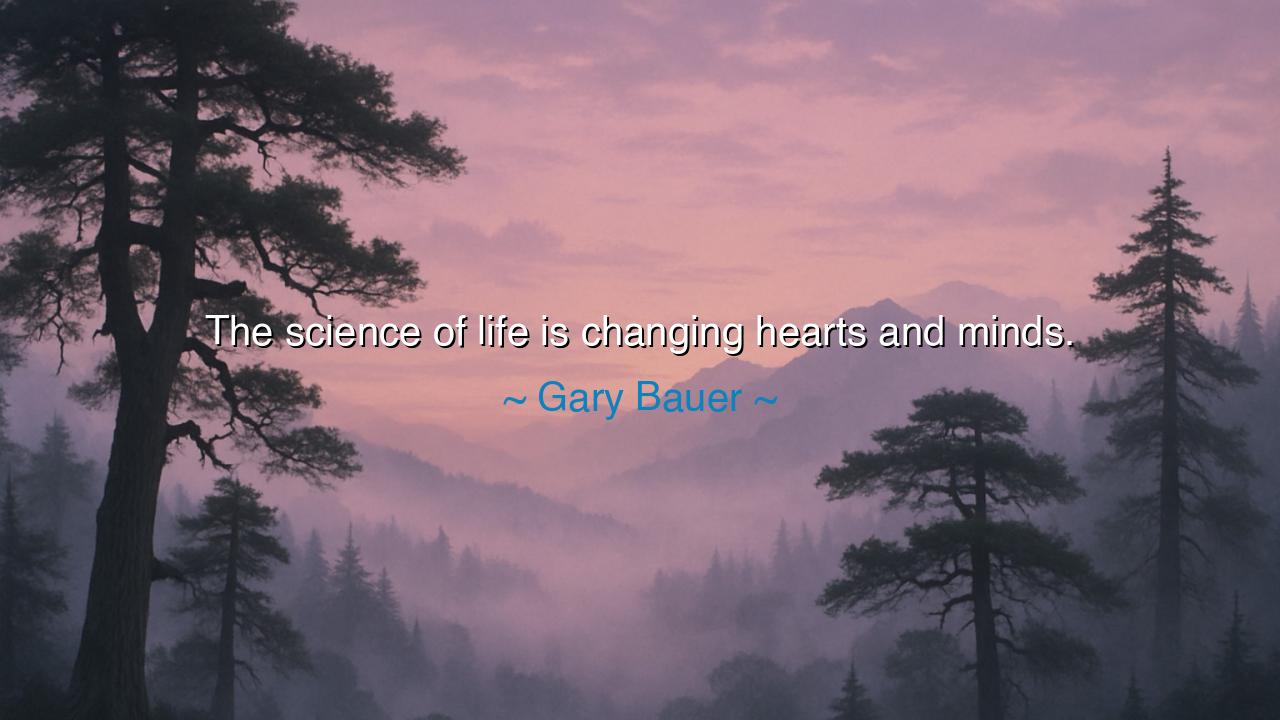
The science of life is changing hearts and minds.






Listen well, O Seekers of Wisdom and Truth, for the words of Gary Bauer carry a profound message that speaks not only to the nature of science, but to its true purpose: "The science of life is changing hearts and minds." These words remind us that science is not just the pursuit of facts and discovery, but a force with the power to transform the very core of human existence. The science of life—whether in the fields of medicine, psychology, or biology—has the potential not only to heal the body but to reach into the soul, changing how we view ourselves and the world around us. Science is not merely a mechanism of understanding; it is a force of change, capable of reshaping the deepest beliefs and emotions that guide human behavior.
In ancient times, the wise philosophers and sages understood that true knowledge was never a cold, detached study of facts; it was about understanding the very essence of life, the soul, and the forces that govern both. Socrates believed that the highest form of knowledge was one that led to virtue—a transformation of the heart, a turning of the soul toward goodness. Plato, in his dialogues, spoke of how knowledge, when applied correctly, should lead to the good life—a life that nurtures both the body and the spirit. These ancient philosophers saw science not as a detached pursuit of abstract knowledge, but as a tool that could guide humanity toward wisdom and moral enlightenment. Bauer’s words reflect this ancient vision: the true power of science lies not in its ability to answer questions but in its capacity to change the very hearts and minds of those who seek it.
The science of life, as Bauer calls it, is the study of the forces that shape human existence. From the ancient herbal remedies that healed wounds and soothed pain to the discoveries of modern genetics and medicine, science has always had the power to transform not only the physical body but also the way we perceive life itself. Consider the case of Edward Jenner, who, in the 18th century, developed the first smallpox vaccine. His discovery didn’t just change the course of medicine; it revolutionized human society by altering the way people understood disease and health. In a time when smallpox was a dreaded and untreatable disease, Jenner’s work changed not only the physical well-being of millions but also the way people viewed their own vulnerability and the potential for human progress.
This shift in thinking is the very essence of the science of life—it is not just about discoveries in a laboratory or data gathered through observation; it is about changing how we view the world, ourselves, and our place within it. Science teaches us that we are not passive beings in a hostile world, but active participants in a universe governed by laws that can be understood and, through that understanding, harnessed. When we understand the science of life, we come to understand not only our bodies but also our minds—the way our beliefs, emotions, and thoughts shape our experiences and actions.
The lesson here, O Seekers, is that science is not merely the domain of intellect or reason; it is a force that can deeply impact our hearts and minds. It is not enough to study the world in terms of facts alone. True knowledge leads to transformation—a deep, inner change that reorients us toward the good, toward compassion, toward a greater understanding of our humanity. As Bauer suggests, the greatest power of the science of life is its ability to inspire us to think and feel in ways that promote healing and growth, not just individually, but collectively as a society.
In your own lives, O Children, take this wisdom to heart. Recognize that science—especially the science that touches on the human experience—is not just an intellectual pursuit. It is a calling to change the very way you think, feel, and act in the world. Whether you are a scientist, a philosopher, a teacher, or a healer, remember that the true power of your work is not just in data or research, but in the ability to inspire a shift in the hearts and minds of those who come into contact with your discoveries. Seek not only to understand the world, but to change it for the better, to help others understand and transform their own lives.
So, O Seekers, let the science of life guide your journey. Whether in the pursuit of knowledge, the practice of healing, or the service of humanity, always remember that the deepest truths are not just facts to be learned but are principles that, when understood, lead to profound changes in how we live and interact with one another. The science of life has the power to heal the body, to change the mind, and to open the heart. Embrace it with reverence and courage, for in it lies the power not just to change the world, but to change the very fabric of human existence. Let the truth you seek be one that not only enlightens the mind but nourishes the soul.






AAdministratorAdministrator
Welcome, honored guests. Please leave a comment, we will respond soon